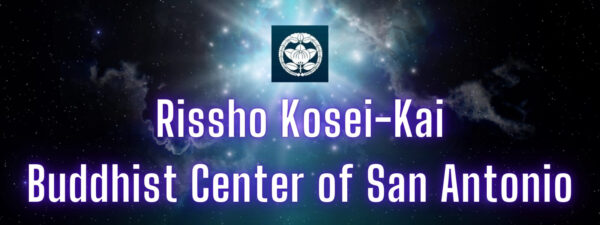The combination of a cause and a condition leads every action to have an effect and a recompense. When a primary cause is annihilated or when, even if it exists, it does not come into contact with a condition, it does not produce an effect and a recompense. Therefore, in this world, there is nothing existing in an eternal, fixed, and unchangeable form. This is the law “All things are impermanent.” Is there nothing at all unchangeable in this world? Yes, there is one immutable thing-the truth that presides over the existence, the working, and the changes of all things. Only this truth alone is unchangeable.
Shakyamuni Buddha also taught the truth that nothing in this world has an isolated existence, without any relation to other things, but that all things exist in relationship with one another and are interdependent. This is the law “Nothing has an ego.” At first glance, there does not seem to be any relation between the earth on which we stand, the sea stretching to the horizon, and the clouds far above in the sky. But when we consider how clouds are produced, why seawater is salt, and how the earth receives moisture, we soon understand the close relationship of earth, sea, and sky. We know that clouds are produced by water vapor that evaporates from the earth, sea, and rivers; clouds precipitate rain or snow that falls on the earth and moistens it; and seawater is salt because river water dissolves salts contained in the earth and carries them to the sea, where the concentration of salt becomes stronger through the evaporation of water. This is an example of how nothing in the universe has a completely isolated existence.
Of course, Shakyamuni Buddha did not preach the formation of the universe as a science or a philosophy. He preached it to cause all people to understand thoroughly how people should live and what human life should be. His teaching always concerned humanity and humanism.
How should we put the universal truths that all things are impermanent and that nothing has an ego to practical use in our daily lives? It was to answer this question that the Buddha preached the law “Nirvana is quiescence.”
We undergo various sufferings in life because we are swayed by changing phenomena and are influenced by immediate gain or loss. If we come to have the spirit of perfect freedom, being detached from these temporary and superficial considerations, we will be in a spiritual condition of peace and calm even when we are in a situation that others consider to be very painful. This is the state of “Nirvana is quiescence” in relation to the law “All things are impermanent.”
The reason for our inability to succeed in something, for having a conflict or dispute, or for feeling displeasure, often comes from the fact that we lack harmony in our relations with other people and things. The earth revolves around the sun. The moon revolves around the earth. The innumerable stars twinkling in the night sky have the same kinds of relationships. The sun, the earth, the moon, and the stars all move according to the law of gravitation. They move without colliding because the force of gravitation is balanced, creating a harmony among them. If this harmony were destroyed, the sun, the earth, and the moon would collide. If this kind of thing took place with all planets and stars, the universe would be destroyed.
Human life is the same. Each person is a constituent member of the universe; if one maintained harmony in one’s various relationships with other people and things so that a balance were maintained among them, dispute and trouble in this world would disappear. But such a state cannot be realized in this world. Why? Because each person has his or her own small “ego.” People differ in their interests and feelings, and are out of harmony with each other because too many people are self-centered and are concerned only with their personal profit, welfare, and comfort. If all human beings abandoned their own small “egos” and devoted themselves to respecting and helping one another, a great harmony would be generated among them and true peace in their daily lives would come about. This is the state of “Nirvana is quiescence” in relation to the law “Nothing has an ego.”
These three laws-“All things are impermanent,” “Nothing has an ego,” and “Nirvana is quiescence” – are the fundamental principles of Buddhism and as such are called the Three Seals of the Dharma (sambo-in). It is no exaggeration to say that all the teachings of Buddhism are derived from these three laws.

